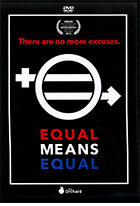
Equal Means Equal 2016
Distributed by Passion River Films, 154 Mt. Bethel Rd., Warren, NJ 07059; 732-321-0711
Produced by Kamala Lopez, Joel Marshall, Gini Sikes, Liz Lopez, Patricia Arquette, and Jyoti Sarda
Directed by Kamala Lopez
DVD , color, 95 min.
High School - General Adult
Activism, Discrimination, Feminism, Human Rights, Labor, Rape, Social Movements, Reproductive Rights, Women’s Rights
Date Entered: 02/07/2017
Reviewed by Elizabeth A. Novara, Curator, Historical Manuscripts, University of Maryland, College ParkEqual Means Equal examines women’s rights in the United States in the present day, with some discussion of international women’s rights efforts. The topics covered in this film are numerous and important, including but not limited to: wage discrimination and the pay gap; domestic violence; rape and sexual assault; pregnancy discrimination and maternity rights; foster care and child sex trafficking; female incarceration; and reproductive rights. International women’s issues are also discussed including the Convention to Eliminate Discrimination Against Women (CEDAW), which is seen as a backdoor method to pass the Equal Rights Amendment (ERA) in the United States. Topics are presented with interesting and animated graphics so that viewers can quickly grasp the basics of each issue. However the film is packed with almost too many facts and figures that go by very quickly, which makes it difficult to tell what sources are being used. Discussions of relevant legal cases are cited early (Betty Dukes v. Walmart) and often and sometimes make the narrative seem choppy.
Significant women’s rights activists and personalities make appearances and share insights such as Gloria Steinem; Patricia Arquette; Terry O’Neil, the current President of National Organization for Women; Jessica Neuwirth, the President of the Equal Rights Amendment (ERA) Coalition; and the several other representatives from major women’s and human rights organizations. In addition to activists, the filmmakers interview or use sound bites from a diverse set of individuals including a Wall Street analyst, legal experts, politicians, victims of domestic violence, rape victims, health experts, an intelligence analyst, journalists, academics, and child prostitution victims, to name but a few examples. The film is produced and directed by Kamala Lopez, an actress and owner of the Heroica Films production company. The film was mainly shot in New York and Los Angeles, with some mentions of Washington, DC; San Jose; and Bristol, Rhode Island. One of the limitations of the film is that it does not try to be comprehensive geographically of women’s views in the United States, but mainly shows women and women’s issues from urban and coastal areas.
Equal Means Equal presents a condensed history of women’s suffrage and the ERA amendment, but focuses on the civil rights issues that women continue to face in today’s world. While the issues discussed are all important, and the film does discuss why the ERA is still needed even with the existence of the 14th Amendment and the Equal Pay Act, a little more time spent on discussing the history of the ERA, the arguments for and against it, and why it failed in the 1970s and early 1980s would have provided viewers with additional context and a better rationale for why they should support the ERA today. For, ultimately, Equal Means Equal, is a documentary with a political message that comes through loud and clear: support the ERA now. American women are facing myriad instances of discrimination throughout their daily lives without even realizing it, and society and the justice system continue to favor capitalist interests rather than supporting equal rights. This is certainly a timely film given the current political environment in the United States, and the film could serve as a general overview to current women’s rights concerns for classroom educators, even if the delivery is a bit awkward at times.
Awards
- Traverse City Film Festival, Best U.S. Documentary, 2016